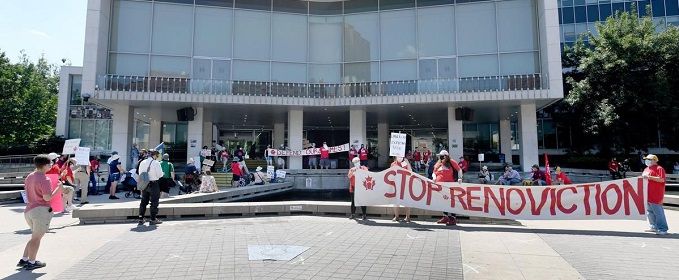In late August, the Ford government announced it was drafting legislation that will freeze rents in many parts of Ontario for 2021. In many quarters this was seen as very good news, but the reality is it will do very little to help tenants in Hamilton, who are increasingly being squeezed out by out-of-control rent increases.
Posted September 9, 2020
In late August, the Ford government announced it was drafting legislation that will freeze rents in many parts of Ontario for 2021. In many quarters this was seen as very good news, but the reality is it will do very little to help tenants in Hamilton, who are increasingly being squeezed out by out-of-control rent increases.
So far in 2020, the average rent for a vacant one-bedroom apartment has increased by 20 per cent to $1,489. That is the fourth-highest increase among 32 cities recently surveyed by property listing service Rentals.ca.
The average rent for that apartment has nearly tripled in the last 20 years, going from $578 per month in 2001 to nearly $1,500. Think about this for a moment. That $1,500 a month is one thing if you are working in a job covered by a collective agreement or in a higher wage bracket. But what if you’re working for minimum wage? If you manage to get 37.5 hours per week, your gross pay is $2,100 a month. So after rent for that one-bedroom apartment, you have $600 left to pay for everything else — food, utilities, entertainment, health-care needs and the rest.
So 71.43 per cent of your monthly income is essential to pay your rent. Keep in mind many minimum wage workers don’t get 37.5 hours a week, and they don’t get to keep that gross wage amount because deductions have to come off the top. A study by the Canadian Centre for Policy Alternatives in 2019 showed that a minimum wage worker in Hamilton would have to work 54 hours a week to afford that same one-bedroom.
Now suppose you are a social assistance recipient. A single Ontario Works recipient receives $731 a month, barely half of the cost of that single-bedroom. Or suppose you receive Ontario Disability benefits, which for a single person total a little less than $1,200, including a shelter allowance.
How on earth are you supposed to live, never mind prosper, if you are a low-income recipient in this community under these circumstances?
Hamilton has about 60,000 household renters. Many of them have seen jobs disappear and incomes reduced due to COVID-19. The waiting list for affordable housing was 15,400, and that was before the pandemic struck. There are 1,225 people listed as homeless by the City of Hamilton.
The situation here is toxic and getting worse, which is why the news about the province freezing many rents for next year doesn’t seem like such a big deal. (It’s also worth noting that the legislation won’t have an impact on any rental properties that are not subject to rent controls.)
What must happen? Ultimately, senior governments need to get involved in a systemic way, as opposed to putting a one-year freeze on rents. But there are things local government can do as well, and one is already being done in New Westminster, B.C.
In that community, a bylaw is in place to halt or at least strongly discourage “renovictions,” the practice of a landlord moving tenants out of a unit under the guise of renovating, and then increasing the rent and profit margins. The bylaw requires developers and landlords to get a permit before doing the work, which creates time for the city to intervene before tenants are forced out.
The tenant and poverty activist group Hamilton ACORN supports a similar bylaw for this city, as well as licensing of landlords and proactively ensuring all tenants know their rights. The City of Hamilton should seriously consider both these ideas, especially the anti-renoviction bylaw. City Hall can’t manage this rental crisis alone, but it can take some helpful direct action, and the time for that is now.
***
Sign up for ACORN’s newsletter
/https://www.thespec.com/content/dam/thespec/opinion/editorials/2020/09/09/hamiltons-rental-crisis-demands-action-from-government/acorn.jpg)

